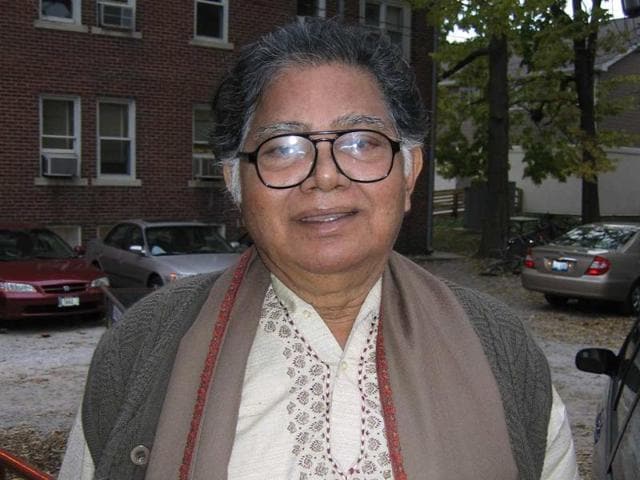The writer's block
To say that a part of me has dropped away with the death of Sunil Gangopadhyay would be too melodramatic. If I had been a character in one of his stories, then such a statement would have invited titters and a retort from a young woman. Indrajit Hazra writes.
To say that a part of me has dropped away with the death of Sunil Gangopadhyay would be too melodramatic. If I had been a character in one of his stories, then such a statement would have invited titters and a retort from a young woman: "Dhyaat! Now you're sounding like one of those TV serial heroes looking up at the ceiling that he thinks is the sky and getting ready to break into Rabindrasangeet!"

But the fact of the matter is rather melodramatic. Like most Bengalis and many Calcuttans, the name of Sunil Gangopadhyay immediately triggers the image of a writer who is more than just a man with a reputation formed by the sum of his writings. Over the last five decades, Gangopadhyay has come to be a part of the climate of Bengali language, literature and, indeed, that knobbly entity called culture.
He has his fair share of detractors - for his political views, his not-always-consensual entanglements with the ladies (the most recent one involving Taslima Nasreen), and his perceived hankerings for the spotlight. But one man straddling the many worlds that exist outside that of the writing desk and revelling in them can seem odd and hyperbolic to outsiders. I find it quite awe-inspiring.
Gangopadhyay was a man of letters as well as a walking-talking oped page sharing his views on literature, food, politics, life and Life. He was there in newspaper and magazine articles, at cultural events as a regular chief guest, and on television. He was the writer who engaged riotously with the world, the sort of literary creature that doesn't go down too well with the sorts who expect a 'serious writer' to be a nib-chewer. I can't think of any other writer anywhere who is a Sahitya Akademi Award recipient-bestselling writer who also adorned billboards in Kolkata endorsing the virtues of a 'healthy' cooking oil brand.
With Gangopadhyay, inhibitions were in short supply. He wrote across the spectrum - voluminous, serialised historical novels, novellas, poetry, short stories, stories for children and essays. And he wrote an astonishing amount. At the time of his death last week, I had just started reading his latest novel, Shoroshwoti-r Paye-r Kachhey (At Saraswati's Feet), that appeared in the Pujo annual edition of the literary magazine, Desh this year. Another annual carried another new Gangopadhyay novel, Ek-Ekta Deen Onnyorokom (Every Day's Different), this one written in his famous pseudonym Neellohith. Yet another annual carried his short story 'Je Proshne-r Uttor Nei' (The Question That Has No Answer) and another publication one of his poems.
This kind of output is bound to make the writings of the best of writers vary in quality. And many of his writings had indeed become repetitious, stretched-out and sometimes plain boring. But I'm not in a position to judge his oeuvre that started as the works of an enfant terrible poet which segued into that of a master prose-stylist and has now ended as that of a veteran man of letters. I haven't read enough of his works and whatever I have, have been by dint of succumbing to the forces of a canonical name in contemporary literature. He isn't in my top five writers list - not even in Bengali. And yet, his seemingly effortless writings hold me by the scruff of my neck as if I've been caught secretly admiring him.
The first Sunil Gangopadhyay work I remember reading was his young adult's novel, Shobuj Deep-er Raja (King of the Green Island) in 1980. Set in the Andamans, it was a cracker of a mystery-adventure story with the uncle-nephew duo of Kakababu and Shonthu. By the late-80s, I had graduated to his 'adult' fare. Even then, at a time when his reputation as one of the heavyweights in Bengali literature had been firmly established by the publication of the epic-historical novels Shei Shomoy (Those Days) and Prothom Alo (First Light), and when new, fresh voices were emerging, I was astounded by Gangopadhyay's ability to 'make stories' with such seamless, intimate, throwaway details that they bore a remarkable resemblance to the real world as it unfurls through its various, continuous and simultaneous snapshot moments.
I was not more than 16 when I read the short story 'Rani O Obinash' (Rani and Abinash). It was about a man confronting his now-married ex-lover and asking her for an 'unnatural' favour. The story gave me my first tantalising evidence of how physical desire can be indistinguishable from romantic love. It gave me the grand illusion of believing that I now knew how a woman's mind may work just a wee bit more than I had before.
Like so many, many others, older and younger than me, I literally grew up reading Sunil Gangopadhyay. With his death, it's suddenly become apparent to me that I am from - and shaped by - a different era that quietly dropped away on Tuesday night. In other words, I feel ravenously old.
Get Current Updates on India News, Lok Sabha election 2024 live, Election 2024 along with Latest News and Top Headlines from India and around the world.



